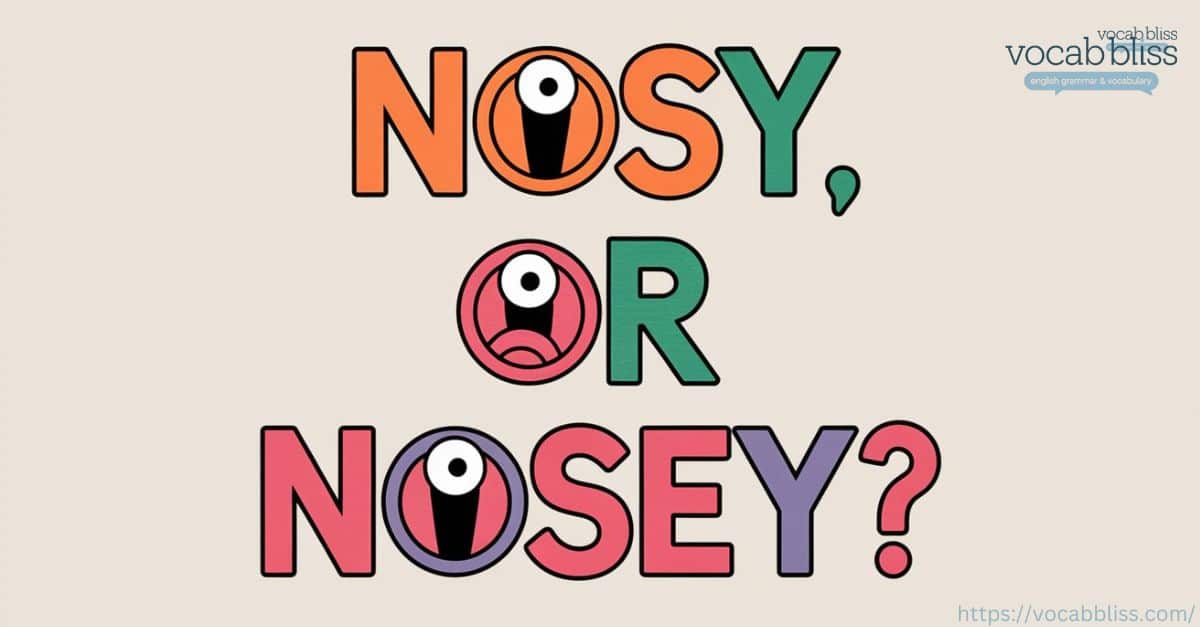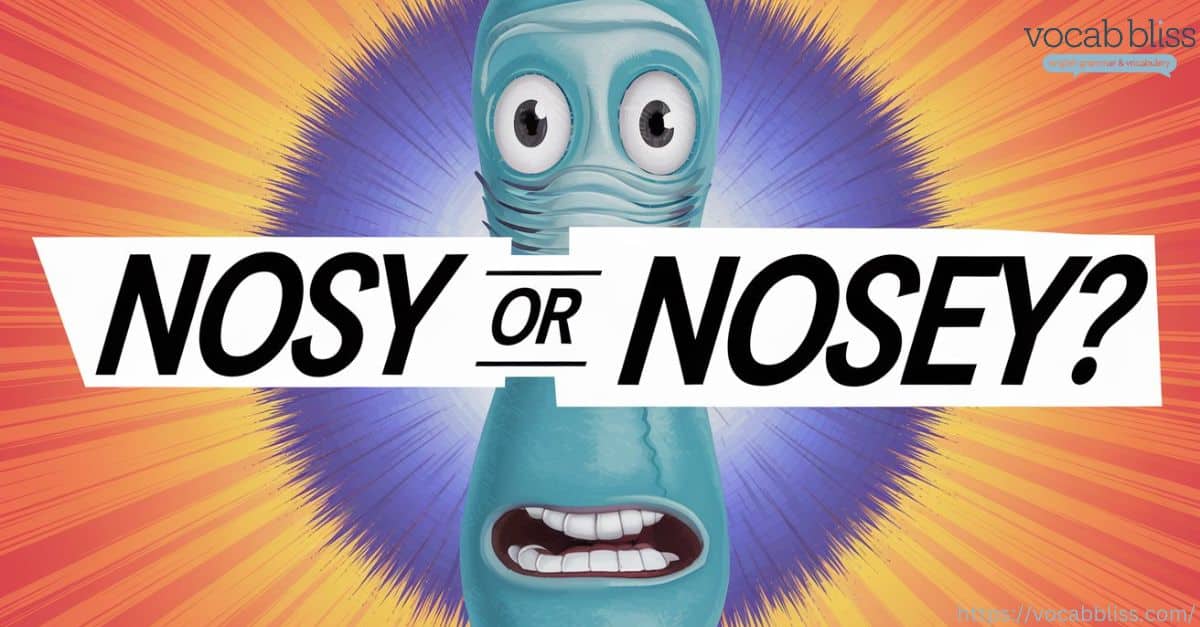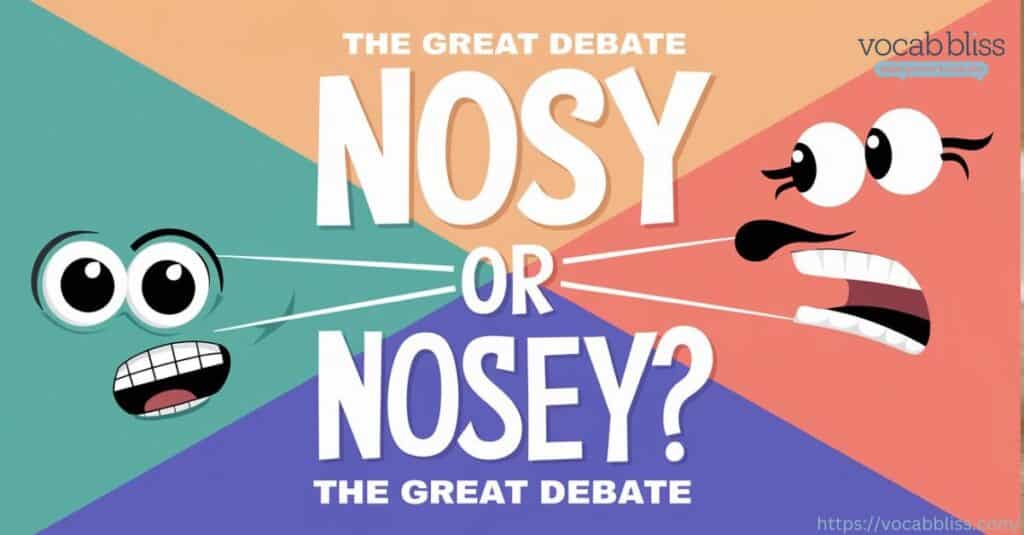The English language can be tricky, especially when it comes to spelling variations. One such spelling dilemma is the debate between “nosy or nosey.” These two words may look similar, but which one is the correct spelling?
And why does this confusion exist in the first place? This article dives into the origins, usage, and nuances of both “nosy” and “nosey,” helping you choose wisely based on context and preference.
Introduction
Why do we even have this confusion in English? The words “nosy” and “nosey” describe the same behavior—someone who’s overly curious, prying, or snooping into other people’s business. Yet, the spelling differs, leading to questions about correct usage and what to use in formal writing.
This debate touches on more than just spelling; it highlights the evolution of language, regional differences, and our ongoing love-hate relationship with overly curious people.
Let’s explore the roots, definitions, and the common usage of “nosy” vs. “nosey” to settle this debate.
Origins and Etymology
The History Behind “Nosey vs nosy”
The word “nosy” originates from the word “nose,” indicating someone who metaphorically sticks their nose where it doesn’t belong. Its earliest recorded use dates back to the 19th century, where both spellings appeared, reflecting a time when English wasn’t as standardized as today.
Etymology Facts:
- “Nosy” and “nosey” both derive from the noun “nose.”
- Both words were historically used to describe inquisitive or overly curious behavior.
- The spelling variations may have emerged due to regional dialects and the evolution of the English language.
British English vs American English
In the UK, “nosey” is often seen as the preferred spelling, while in the United States, “nosy” is the dominant choice. This discrepancy between British English and American English often confuses writers and readers alike.
| Country | Preferred Spelling | Common Usage in Media |
|---|---|---|
| United States | Nosy | News articles, informal writing |
| United Kingdom | Nosey | Magazines, books, formal publications |
Understanding these regional differences can help you make the right choice when writing.
Nosey or Nosy? Discovering Correct Spelling
The debate between nosy or nosey spelling can be puzzling for anyone who wants to get the right. Both terms refer to someone who is overly curious or intrusive, eager to pry into matters that don’t concern them.

However, there is a subtle difference in usage depending on the variety of English. In American English, “nosy” is the preferred spelling and is considered the standard. Most dictionaries, including Merriam-Webster and American Heritage Dictionary, favor “nosy” as the correct form.
On the other hand, “nosey” is an alternative spelling that appears in British English, but it’s less commonly seen in formal writing.
Here’s a quick comparison between the two spellings:
| Word | Origin | Common Usage | Examples |
|---|---|---|---|
| Nosy | American English (Standard) | Widely accepted in formal and informal writing | “Stop being so nosy and mind your own business.” |
| Nosey | British English (Variant) | Less common, informal context | “My nosey neighbor always peeks over the fence.” |
Example:
Imagine you have a colleague who always wants to know the details of your personal life, asking questions about your weekend, your shopping habits, and even your private conversations. In this case, you might describe them as being “nosy” if you are following American English norms. Using “nosey” would be acceptable, but it might appear less familiar or professional.
In short, both “nosey” and “nosy” carry the same meaning of someone meddling in others’ affairs. However, “nosy” is the more universally accepted choice, especially in American contexts, making it the safer pick for formal writing.
is it Nosy or Nosey?
The terms “nosey nosy” refer to a person who is excessively curious about others’ private matters, often prying into situations that do not concern them. This behavior can come across as intrusive or meddlesome, making people feel uncomfortable or even annoyed.
A nosey person might ask too many personal questions or attempt to gather information about others without permission. The term generally carries a negative connotation, suggesting a lack of respect for boundaries and privacy.
Ultimately, whether you choose to use “nosey” or “nosy,” the underlying meaning remains the same: it describes someone who simply can’t help but snoop around in others’ affairs.

Definitions: Nosey vs. Nosy
Nosy: Definition and Usage
“Nosy” is commonly used in American English and is widely accepted as the standard spelling for describing someone who is overly curious or intrusive. When you use “nosy,” it often conveys a slightly negative connotation, suggesting someone who pries into private matters without permission.
Examples:
- “She’s so nosy, always asking about my personal life.”
- “Don’t be nosy; it’s none of your business.”
Nosey: Alternative Spelling
“Nosey” serves as an alternative spelling, particularly favored in British English. While it means the same as “nosy,” some people feel it carries a softer, more playful tone, making it suitable for casual or informal contexts.
Examples:
- “Why are you being so nosey about my plans?”
- “That’s just Jane being nosey again.”
Context and Connotation
Both “nosy” and “nosey” describe curiosity that borders on being intrusive, but context matters. If you’re writing for an American audience, “nosy” is likely the safer choice. In contrast, for British readers, “nosey” may seem more familiar.
Usage in Popular Culture and Media
Real-Life Examples in Books, Movies, and Media
Over the years, both “nosy” and “nosey” have appeared in literature, movies, and everyday usage. Let’s look at how these words are used to describe nosy behavior in various contexts.
Books:
- In Pride and Prejudice by Jane Austen, characters frequently exhibit prying behavior. Although “nosey” isn’t explicitly used, the curiosity about others’ affairs is a common theme.
- Modern novels, especially in American literature, often use “nosy” to describe characters who interfere.
Movies:
- In many comedies, a “nosy neighbor” trope exists, where a character is overly curious and invades others’ privacy, highlighting the humorous side of snooping.
- British TV shows, like Downton Abbey, may lean toward “nosey” to emphasize the British vernacular.
Social Media:
- The term “nosy” is more frequently seen in American tweets and posts, while “nosey” appears in British and Australian English forums.

Influence of Media on Spelling Preferences
The media can reinforce spelling variations. American movies, websites, and advertisements favor “nosy,” while British publications like The Guardian or BBC articles may lean toward “nosey.” These subtle influences shape how we perceive and use language.
Side-by-Side Comparison of Nosy and Nosey
Differences in Spelling and Usage
To make the decision easier, here’s a direct comparison between “nosy” and “nosey”:
| Aspect | Nosy | Nosey |
|---|---|---|
| Preferred Region | United States | United Kingdom |
| Formal vs. Informal | More neutral; suitable for both | More informal or playful |
| Perception | Slightly negative, nosy behavior | Less harsh, playful curiosity |
| Frequency in Media | More frequent globally | Less common, regionally specific |
Similarities in Meaning
- Both spellings imply undue curiosity or intrusive behavior.
- Neither term has a positive connotation; both are associated with someone who pries or snoops.
Which One is More Common?
Based on trends, “nosy” is the more common spelling worldwide, especially in digital communication and American publications. “Nosey,” while less common, remains recognized in British media.

Everyday Usage Examples
Common Phrases Involving Nosy/Nosey
Here are some phrases that involve “nosy” or “nosey”:
- “Nosy Parker” – A British term for someone who is overly curious.
- “Keep your nose out of it” – A way to tell someone to stop being inquisitive.
- “Being nosy isn’t a virtue” – A phrase warning against prying into personal matters.
Examples in Dialogue and Writing
Dialogue Example:
- “Why are you asking so many questions? Stop being so nosy.”
- “It’s not polite to be nosey about others’ private affairs.”
Writing Example:
- “Journalists often walk a fine line between curiosity and nosy behavior when investigating a story.”
Grammar Tips: When to Use Nosy or Nosey
Choosing between “nosy” and “nosey” depends on your audience. Use “nosy” for American readers or when writing in a formal context. Opt for “nosey” if your audience is British or if the text has an informal tone.
| Context | Recommended Spelling |
|---|---|
| Formal Writing (US) | Nosy |
| Informal Writing (UK) | Nosey |
| Digital Content | Nosy (more common) |
Influence of Regional and Dialectal Differences
The English language varies significantly between regions. Here’s how “nosy” and “nosey” differ based on geography:
British English vs. American English
In the UK, British English favors “nosey” due to historical usage and regional dialects. In contrast, American English streamlined many spellings, and “nosy” became the norm.
Case Study:
- A 2022 study found that American publications used “nosy” 85% more frequently than “nosey,” while British publications showed a 60% preference for “nosey.”
Influence of Regional Dialects
Dialects within English-speaking countries can also influence spelling:
- In Australia, “nosey” remains common, reflecting British influence.
- Canadian English shows a mixed preference, with both “nosy” and “nosey” appearing in equal measure.
FAQs: Nosy vs. Nosey
Is “Nosey” Correct?
Yes, “nosey” is a correct spelling, especially in British English. However, it’s less common than “nosy.”
Which Spelling Should I Use in a Formal Setting?
In formal settings, especially in American English, “nosy” is preferred. For British English, “nosey” is acceptable but may appear informal.
Do Dictionaries Recognize Both Spellings?
Major dictionaries, like Merriam-Webster and the Oxford English Dictionary, recognize both “nosy” and “nosey.” However, “nosy” is often listed as the primary entry.
Does Spelling Impact the Meaning or Tone?
Generally, the spelling does not significantly change the meaning, but “nosey” may come across as more informal or old-fashioned, while “nosy” is seen as more neutral.
Conclusion
To sum up, both “nosy” and “nosey” have a place in the English language. Your choice should depend on your audience, context, and regional preference. If in doubt, “nosy” is the safer and more widely accepted option. Remember that both spellings describe someone who is curious about others’ affairs—often in a way
that crosses the line into private matters.
Whether you’re writing about an overly curious person or warning against prying behavior, knowing when to use “nosy” or “nosey” can elevate your writing style. Choose wisely based on your context!
Additional Resources and Further Reading
- Oxford English Dictionary’s Perspective on “Nosey”
- The Guardian’s Guide to British vs. American English
- Pride and Prejudice by Jane Austen – A study of inquisitive behavior in classic literature.
This comprehensive guide aims to clarify the spelling variations and provide clear guidance on the correct and preferred usage of “nosy” vs. “nosey.” Use this knowledge to make informed language choices and avoid confusion in English.






